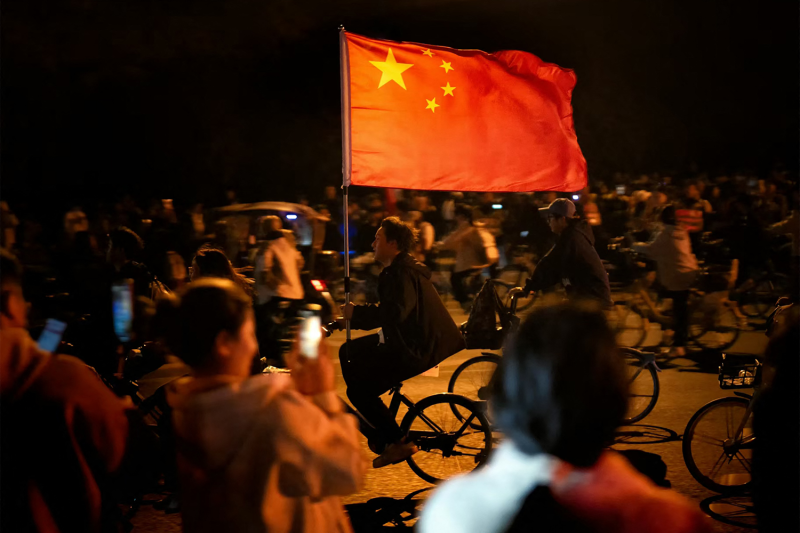Trump Gets the Middle East Right

Trump Gets the Middle East Right
The U.S. president has correctly abandoned decades of tradition in the region.
President Donald Trump addresses the audience at the King Abdul Aziz International Conference Center while attending a Saudi-U.S. business investment forum, on May 13, 2025, in Riyadh, Saudi Arabia. Win McNamee/Getty Images
A few weeks after taking the oath of office in 2021, U.S. President Joe Biden appeared at the State Department to give the first foreign-policy address of his new administration. During his talk, the new president famously declared that “America is back.” In this not-so-subtle rebuke of his predecessor, Biden was signaling that he was placing American values at the forefront of his foreign policy. As he promised in his campaign, there would be “no more blank checks” for the likes of Egyptian President Abdel Fattah al-Sisi (Donald Trump’s “favorite dictator”) and the Saudis, who he vowed to make “them the pariahs that they are” and in the process make them “pay a price.”
Students of U.S. foreign policy—and cynics more generally—understood that Biden was going to eat his words in time. In May 2021, he was on and off the phone with Sisi, who won the White House’s gratitude for helping broker a cease-fire during a round of violence between Israel and Hamas. The following summer, Biden visited Saudi Arabia, where he fist-bumped the previously unacceptable Crown Prince Mohammed bin Salman.
A few weeks after taking the oath of office in 2021, U.S. President Joe Biden appeared at the State Department to give the first foreign-policy address of his new administration. During his talk, the new president famously declared that “America is back.” In this not-so-subtle rebuke of his predecessor, Biden was signaling that he was placing American values at the forefront of his foreign policy. As he promised in his campaign, there would be “no more blank checks” for the likes of Egyptian President Abdel Fattah al-Sisi (Donald Trump’s “favorite dictator”) and the Saudis, who he vowed to make “them the pariahs that they are” and in the process make them “pay a price.”
Students of U.S. foreign policy—and cynics more generally—understood that Biden was going to eat his words in time. In May 2021, he was on and off the phone with Sisi, who won the White House’s gratitude for helping broker a cease-fire during a round of violence between Israel and Hamas. The following summer, Biden visited Saudi Arabia, where he fist-bumped the previously unacceptable Crown Prince Mohammed bin Salman.
The idea that U.S. foreign policy reflects or at least should reflect American values is something that the U.S. foreign-policy community repeats to itself, but it is mostly a myth. The list of human rights abusers who were American partners is long, indeed.
That’s why U.S. President Donald Trump’s speech in Riyadh last week was refreshing. He dispensed with any pretense about American exceptionalism, principles, or values, acknowledging that when the United States engages in a missionary foreign policy, it can and has done a fair amount of damage to itself and the part of the world it seeks to redeem.
Before I get hate mail, let me be clear: There is cynicism and then there is Trump cynicism. The scheme to score a tricked-out Qatari 747 plane and Trump’s claim to be blithely unaware of how his sons and Zach Witkoff are cashing in on some Trump-branded crypto nonsense with the help of partners in Dubai surely belong in the pantheon of his shamelessness. The bromances with Mohammed bin Salman (“I like you took much”), Qatar’s “tall and handsome” Emir Tamim bin Hamad Al Thani, and the United Arab Emirates’ President Mohammed bin Zayed, who Trump said was “a magnificent man,” are downright creepy.
Trump’s claim that he prevented “them”—whoever they are—from the designating what is routinely referred to in maps in multiple languages as the Persian Gulf (and sometimes the Arabian Gulf), as the “Gulf of I-ran” was hilarious, and not in a good way. And lifting sanctions on Syria without simultaneously ensuring that sanctions relief and normalization of relations are subject to conditions doesn’t seem to be a well-thought-out policy.
Still, Trump’s visit, and particularly his speech in Riyadh, was important for its forthrightness about what he and his administration believe is Washington’s appropriate place in the region. It is a vision—for lack of a better term—that should make both so-called restrainers and interventionists unhappy.
Trump ripped neoconservatives and liberal internationalists for the neocolonial projects of the last three decades that sapped the power and resources of the United States without actually building any stable nations. This was hardly a surprise. It’s a line of criticism that has been a theme of Trump’s three runs for the White House. And overall, it is a good thing for the president to remind audiences both at home and abroad that when Washington actively tries to make good things happen in the Middle East—Operation Iraqi Freedom, the Freedom Agenda, and building a Palestinian state—it usually fails.
In contrast, when the United States has been more defensive in its approach to the region—seeking above all to prevent disruptions to free flows of energy and threats to Israel’s security, or preventing other countries or groups of countries from challenging its primacy in the service of those issues—it’s been relatively successful. Although even those efforts have come with setbacks and mostly moral costs.
Noticeably absent from Trump’s speech in Saudi Arabia was any rhetoric of restraint—the sort of blather about the need for U.S. withdrawal or “off-shore balancing” because Washington allegedly has few interests in the Middle East. Instead, it is clear that Trump wants the United States to stay in the Middle East, just in a different way than in the recent past. Trump prioritizes active diplomacy to manage and resolve problems and provide security for U.S. partners. And, most importantly for the President, he wants to promote America as a destination for foreign direct investment. It is hard to argue with any of this, especially if the Gulf states make good on their promises to pour money into economic projects in the United States.
There is no doubt that a lot can go wrong in this region. The Israelis are ramping up their military activities in Gaza, and there remains no workable plan for the area when the war eventually comes to an end. A nuclear deal that is better than the 2015 Joint Comprehensive Plan of Action is hardly assured. Analysts can argue with his approach to these specific problems—cutting deals with Hamas does not help in the long run and U.S. special envoy Steve Witkoff seems to be too credulous in his talks with the Iranians.
But those flaws are separate from the basic point that Trump articulated in Riyadh, where he dismissed the shared analysis of the two long-competing camps in the United States’ approach to the Middle East with their shared analysis of Washington’s role. Separate from the president’s apparent grift and peculiarities, he is shaking off a legacy of failure.
There were parts of Trump’s trip that looked and sounded crude, but his approach is hardly wild—and that’s because it is rooted in the way the world is, not the way many folks in Washington would like it to be. And, as a result, one can expect it to be more successful than that of his predecessors.
Steven A. Cook is a columnist at Foreign Policy and the Eni Enrico Mattei senior fellow for Middle East and Africa studies at the Council on Foreign Relations. His latest book is The End of Ambition: America’s Past, Present, and Future in the Middle East. X: @stevenacook
More from Foreign Policy
-

This handout picture provided by the office of Iranian Supreme Leader Ayatollah Ali Khamenei shows him praying inside the tomb of the late Supreme Leader Ayatollah Ruhollah Khomeini in Tehran on Jan. 30. Why Khamenei Is Betting on Trump
The calculus behind Iran’s stunning reversal on a new nuclear deal.
-

Musk wears a red had that reads “GULF OF AMERICA.” Elon Musk Was Donald Trump’s Useful Idiot
It’s looking increasingly likely that the world’s richest man got played.
-

With Jared Kushner to his left, Donald Trump listens to the rabbi Shmuel Rabinovitch during a visit to the Western Wall in Jerusalem’s Old City on May 22, 2017. Trump Isn’t Following the Script on Israel
In dealing with Netanyahu, the U.S. president appears to actually be living up to his campaign slogan to put America first.
-

Indian Air Force personnel stand in front of a Rafale fighter jet during a military aviation exhibition at the Yelahanka Air Force Station in Bengaluru. A Tale of Four Fighter Jets
The aircraft India and Pakistan use to strike each other tell a story of key geopolitical shifts.










Join the Conversation
Commenting on this and other recent articles is just one benefit of a Foreign Policy subscription.
Already a subscriber?
.
Subscribe
Subscribe
View Comments
Join the Conversation
Join the conversation on this and other recent Foreign Policy articles when you subscribe now.
Subscribe
Subscribe
Not your account?
View Comments
Join the Conversation
Please follow our comment guidelines, stay on topic, and be civil, courteous, and respectful of others’ beliefs.
Change your username |
Log out
Change your username:
CANCEL
Confirm your username to get started.
The default username below has been generated using the first name and last initial on your FP subscriber account. Usernames may be updated at any time and must not contain inappropriate or offensive language.